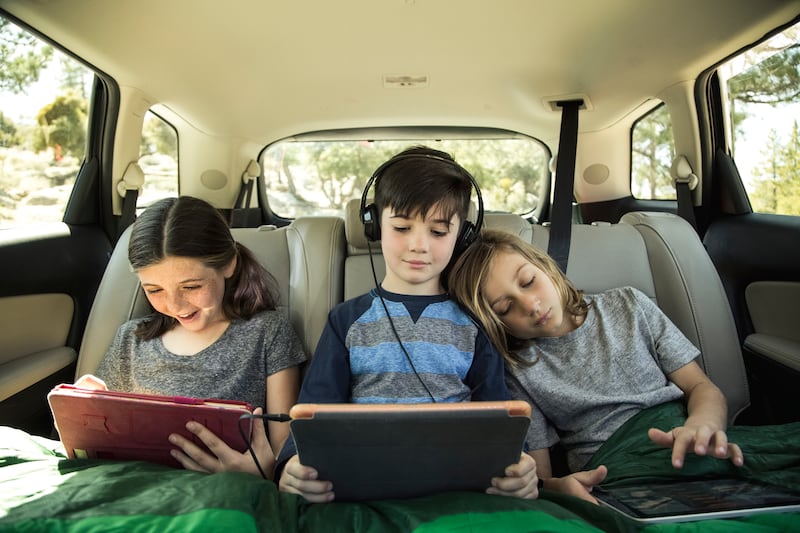Screens dominate our lives more than ever before. Televisions, computers, laptops, tablets and phones present us with a huge amount of screen real estate, with billions of pixels all vying for our attention. Little wonder that the debate surrounding the appropriate amount of screen time for children shows no sign of dying down. Depending on where you are in the world, governments, politicians and health authorities have very different opinions as to what constitutes too much. In Australia, for example, parents are advised to allow no more than an hour a day for children aged 2 to 5. The Chinese government only allows minors to play online games for 90 minutes on any weekday, and has referred to electronic games as “spiritual opium”. These kind of policies seem to be aligned with the common parental hunch that too much screen time just isn’t good for kids. But is it actually true?
“Screen time is a concept from a different era,” says Professor Sonia Livingstone at the London School of Economics, and author of the book Parenting for a Digital Future: How Hopes and Fears about Technology Shape Children's Lives. “A concept from when screens were just about entertainment. Once they become about learning, about work, about staying in touch with people and with information, the idea of imposing time limits becomes impossible. Life is digital.”
The pandemic, and the way it forced whole families to depend on screens for a whole range of new uses, made it particularly difficult to impose limits on usage. But even before Covid-19, researchers were already finding that watching the clock and counting the hours that children spent looking at screens wasn’t necessarily the best approach. One study at the University of Colorado Boulder found that children who spend more time with digital devices had larger friendship groups. Another, at the Oxford Internet Institute, reported “little or no support for the theory that digital screen use, on its own, is bad for young children’s psychological well-being.” Livingstone believes that the more important factors are the quality of content children are engaging with, the context within which they engage with it, and who the technology is connecting them to. “The academic community has been coming up with lots of ideas, [such as] advising parents on sharing screen time with their children to help them make judgments and building media literacy,” she says.
These ideas, however, seemed at loggerheads with the findings of the clinical community who, after all, have first-hand experience of children being referred to clinics with symptoms of addiction to gaming, or social media. Anecdotally, the problem is irrefutable; it’s easy to find stories of children whose mental health appears to have been damaged by excessive screen time. But Livingstone believes that this argument is resolvable. “One to two per cent of children really do have a problem that takes over their lives, but for the rest, it’s a matter of judgment,” she says.
That judgment is critical. There is undeniably a wealth of problematic material that children could stumble across online, from pornography to addictive content and beyond. As our lives have moved online, so has hate, bullying, harassment and exploitation. “Parents are right to be worried,” says Livingstone. “It’s just that keeping [children’s screen time] to, say, two hours a day won’t solve the problem.” Attempting to enforce that limit presents an additional set of problems; screens are everywhere, parents are exhausted, and heavy-handed policing can lead to children feeling trapped and resentful.
These common parental worries sit within a broader generational dynamic which has been going on for hundreds if not thousands of years, where the changing behaviour of children causes older generations to assume that they’re in some kind of downward spiral. Adults project their own memories of childhood on to those of their own children, and any discrepancies are seen as problematic. In the 21st century, when society and behaviour is changing so rapidly, those feelings are bound to be magnified. “Our childhoods were much less screen dominated,” says Livingstone. “So parents do worry that if it carries on escalating at this rate, their children will never go out of the house at all. It’s a kind of projection, coupled with nostalgia.”
Adults are also experiencing their own difficulties with screen time, including – but by no means limited to – social media addiction. Their instincts may tell them that if they’re having difficulties, how would a young person cope? “These services are designed to be compulsive,” says Livingstone, “so parental role modelling is a hugely important influence. If parents are using screens all the time and saying ‘oh God, I feel guilty but I can't stop’, that's what children learn.”
The arguments both for and against screen time will rumble on, not least because it’s impossible to conduct clean experiments that can irrefutably prove their influence either way, for good or for bad. “The key prediction is always 20 years away,” says Livingstone. “If I think back 20 years, we weren't having these conversations about the internet being compulsive. But now it's all coming at us, and it's designed to monetise us and designed to collect our data. No one saw it coming, and maybe we can't see what's coming next. But we can still learn.” She points out that children’s rights to information, expression, play and communication are at stake in this debate. Screens aren’t inherently evil, and the children who love them aren’t a threat to society. Dangers certainly exist, but it would seem that blanket rules are perhaps not the best way of navigating them.





